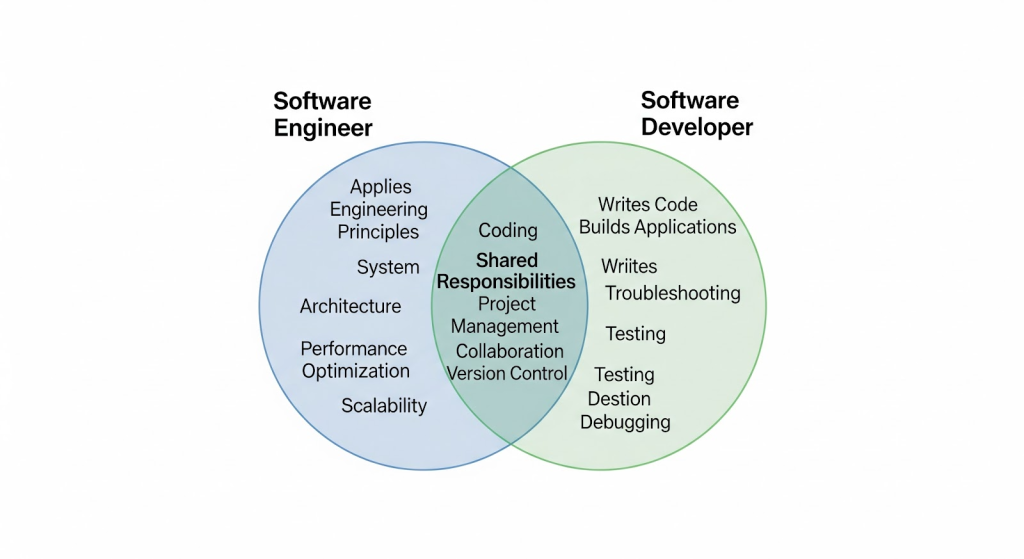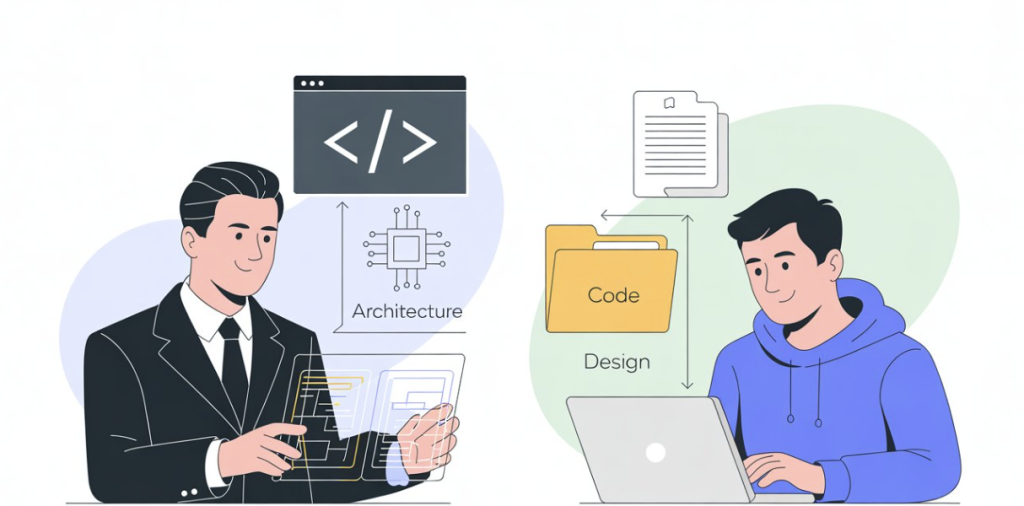Hey future engineer,
If you’re trying to understand the difference between a Software Engineer and a Software Developer, you’re in the right place.
In this article, I’m going to share how they differ in terms of education, skills, daily work, job roles, salaries, and more. And don’t worry, I’ll keep it simple and avoid heavy technical jargon.
Whether you’re planning a career in tech or are just curious, this guide will be worth your time.
Ready? Let’s dive into it…
In reality, the roles of Software Engineers and Software Developers often overlap, and many companies even use the titles interchangeably. But broadly speaking:
- Engineer = planning + designing + problem-solving
- Developer = coding + building the actual software
Why This Comparison Matters?
If you’re new to the tech world, terms like Software Engineer and Software Developer can be confusing. Sometimes they sound the same, and other times people make them seem completely different.
So why does it matter? Because knowing the difference helps you in a few important ways:
- Better understanding of two different roles – Even though many companies use these titles interchangeably, Engineers and Developers often focus on different aspects of building software. Knowing the difference gives you a clearer picture of how the tech world works.
- Clarity for your career – If you’re planning to enter the tech field, knowing what each role does will help you choose the right path that matches your interests and strengths.
- Learn the right skills – When you know the difference, you can focus on the skills that actually matter for your chosen path. Engineers need more system design, architecture, and problem-solving skills, while Developers put more energy into coding, frameworks, and building apps. This way, you won’t waste time trying to “learn everything in tech.
- Better career growth – Once you pick the right starting point, you can plan your growth path. Some people start as Developers and later move into Engineering roles, while others stick to coding because that’s what they love most.
In short, this comparison matters because it clears up the fog and helps you focus on the right skills, the right jobs, and the right career path.
Now, let’s dive into the differences between Software Development and Software Developer.
Let’s understand this first by their definition and real meaning.
What is a Software Engineer?
A Software Engineer is someone who applies the principles of engineering to design, build, and maintain software systems. Think of them as the architects of the software world – looking at the bigger picture, planning how all the pieces should fit together, and making sure everything is reliable, scalable, and efficient.
Unlike simply writing code, software engineering is about solving problems with structure and discipline. It covers the full life cycle of software:
- Understanding requirements (what the software needs to do)
- Designing the system (how it should be built)
- Implementing solutions (writing and organizing code)
- Testing for reliability (making sure it works under different conditions)
- Maintaining and improving (fixing bugs, scaling, and adapting to change)
In other words, a Software Engineer doesn’t just “make the app work.” They make sure it works well, works at scale, and can keep working years down the road.
What is a Software Developer?
A Software Developer is someone who focuses on creating software applications by writing, testing, and maintaining code. Think of them as the builders in the software world – the ones who take ideas, designs, and plans and turn them into working programs that people can actually use.
While a Software Engineer might focus more on system design and big-picture problem-solving, a Software Developer is usually closer to the actual construction of the product. Their primary responsibility is to bring software to life through coding.
What Do Software Developers Do?
- Write code – turning requirements and designs into functional software.
- Work with frameworks and tools – using programming languages, libraries, and platforms to speed up development.
- Fix bugs and issues – making sure the application runs smoothly.
- Collaborate with teams – working with designers, engineers, and testers to deliver features.
- Update and maintain apps – improving performance and adding new features over time.
In simple words, Software Developer, expect the role to involve more hands-on coding and building rather than high-level planning and system design.
How Software Engineers and Developers Overlap:

Now that we’ve looked at what a Software Engineer and a Software Developer are, here’s the truth: in the real world, the two roles often look very similar. In fact, many companies use the terms interchangeably, which is why it can feel so confusing.
Here’s where they overlap:
- Both write code – Whether you’re called an Engineer or a Developer, you’ll spend a lot of time programming.
- Both solve problems – They deal with bugs, errors, and performance issues, and work to find solutions.
- Both use similar tools – Programming languages, frameworks, version control systems (like Git), and development environments are common to both roles.
- Both collaborate in teams – They often work side by side with designers, testers, product managers, and each other to deliver software.
- Both can grow into similar careers – A Developer can take on engineering responsibilities over time, and Engineers can focus heavily on coding if that’s what the project demands.
A simple way to think about ‘:
While Engineers are more likely to focus on planning and design and Developers on building and coding, in practice, most jobs involve a mix of both. That’s why you’ll often see someone with the title “Software Engineer” doing day-to-day development work, or a “Software Developer” making design decisions.
Software Engineer vs. Software Developer: Key differences based on different parameters
Education and Background
- Software Engineer – They often have background in computer science, software engineering, or related fields. Many engineers study topics like algorithms, system design, data structures, and even project management. Their education tends to be broader, preparing them to understand the big picture of building and maintaining complex systems.
- Software Developer – May or may not have a formal degree in computer science. Some developers are self-taught, some come from coding bootcamps, and others from engineering schools. The focus here is more on practical coding skills rather than theoretical foundations.
In short: Engineers usually come from a more formal and theory-heavy background, while Developers can enter the field through many different paths.
Skills Required
- Software Engineer – Needs strong
- . They focus on system architecture, scalability, testing strategies, and long-term reliability. They also think about constraints like performance, cost, and safety.
- Software Developer – Needs solid coding skills and hands-on knowledge of languages, frameworks, and tools. Developers focus on building apps quickly and efficiently, turning requirements into working software.
Note: Engineers focus more on structure and long-term planning, while Developers focus on coding and building things that work right now.
Day-to-Day Work and Responsibilities:
- Software Engineer – Their daily work involves analyzing requirements, designing solutions, creating architecture diagrams, and making sure the software can grow and scale. They might still write code, but a lot of their time goes into planning, problem-solving, and ensuring quality.
- Software Developer – Their daily work is usually more code-heavy. They write features, fix bugs, test their code, and push updates. They focus on the parts of the project assigned to them and make sure those pieces work correctly.
Job Roles in Companies
- Software Engineer – Often found in larger companies or projects where software needs to scale for millions of users. Job titles may include Software Engineer, Systems Engineer, Backend Engineer, or Full-Stack Engineer. They usually work closely with architects, product managers, and QA teams.
- Software Developer – More common in smaller companies, startups, or project-based work where building features quickly matters. Job titles may include Software Developer, Web Developer, Application Developer, or Mobile App Developer. They usually focus more directly on creating user-facing features.
Salary Comparison
- Software Engineer – Generally earns a bit more, especially in larger organizations, because the role involves broader responsibility – planning, system design, and ensuring long-term quality. Salaries also grow as they take on more complex roles like Senior Engineer, Architect, or Engineering Manager.
- Software Developer – Salaries can be slightly lower, though it depends heavily on location, company, and skills. In startups or small companies, Developers may earn less than Engineers, but in certain high-demand areas (like mobile or full-stack development), they can earn just as much.
Based on available data, in India, Software Engineers typically earn between ₹5.45 lakhs and ₹17 lakhs annually, while Software Developers usually fall within the range of ₹4.4 lakhs to ₹12 lakhs per year. (Source: glassdoor.co.in)
Which Career Path Should You Choose?

Now, you’re well aware of the differences between a software engineer and a software developer. I believe you can now make a better decision about which career path to choose.
Remember, choosing one isn’t about which title sounds cooler – it’s about what kind of work excites you the most.
If you’re still not sure, let me help you figure it out…
The first thing most people wonder is: “Do I need a computer science degree to get into these careers?”
The answer also depends on whether you’re aiming to become a Software Developer or a Software Engineer.
- Software Developer – This path is often more flexible. You don’t always need a formal CS degree. Many developers are self-taught or learn through online software development courses, coding bootcamps, or certifications. If you’re willing to put in the effort to build real projects and showcase your skills, you can land a developer job without a B.Tech or computer science background.
- Software Engineer – Here, companies usually prefer candidates with a degree in computer science, IT, or related fields. Having a B.Tech/CS degree often gives you an advantage, especially in India, because engineering roles involve deeper concepts like system architecture, scalability, and complex problem-solving. While it’s still possible to break into engineering without a degree, you’ll often be competing with candidates who have one.
So, if you don’t plan on pursuing a degree, starting as a Software Developer is the best route. You can later grow into engineering roles as you gain more experience and strengthen your foundations.
Now, let’s look at other aspects that are worth considering:
If you like problem-solving and big-picture thinking
You might enjoy the Software Engineer path. Engineers work on designing systems, planning how everything should fit together, and making sure the software can handle growth and complexity.
If you love coding and building things
You might enjoy the Software Developer path. Developers spend more time writing code, building apps and websites, and seeing their work turn into real products that users can interact with.
How to Decide Based on Your Goals
- No degree but motivated to learn through online certifications and projects? → Developer is your best starting point.
- Have (or plan to get) a computer science/B.Tech degree and enjoy problem-solving at scale? → Engineer might be the right choice.
- Still figuring it out? → Start with Developer skills (since coding is the foundation of both). As you grow, you can decide whether to stick with development or transition into engineering.
Note: Developer roles are easier to break into without a degree, while Engineer roles often give preference to CS graduates. But both paths can overlap as you gain experience.
Final Thoughts!
We’ve covered a lot – from what Software Engineers and Developers do, to their education, skills, daily work, salaries, and career paths. By now, you should have a clear picture of how these roles differ and where they overlap.
If you don’t have a computer science degree (and don’t plan to get one), becoming a Software Developer is often the most practical path. With online certifications, bootcamps, and self-learning, you can build the skills needed to start your career.
On the other hand, if you already have (or, aim to pursue) a CS/B.Tech degree and want to dive into designing complex systems and solving large-scale problems, then the Software Engineer path might be the right fit for you.
At the end of the day, both roles matter. Developers bring ideas to life with code, while Engineers ensure everything is reliable and built to last. Your choice should depend on what excites you most.👉 And if you’d like me to suggest some of the best software courses to get started, let me know in the comments. In my upcoming article, I’ll make sure to publish a complete list for you.

